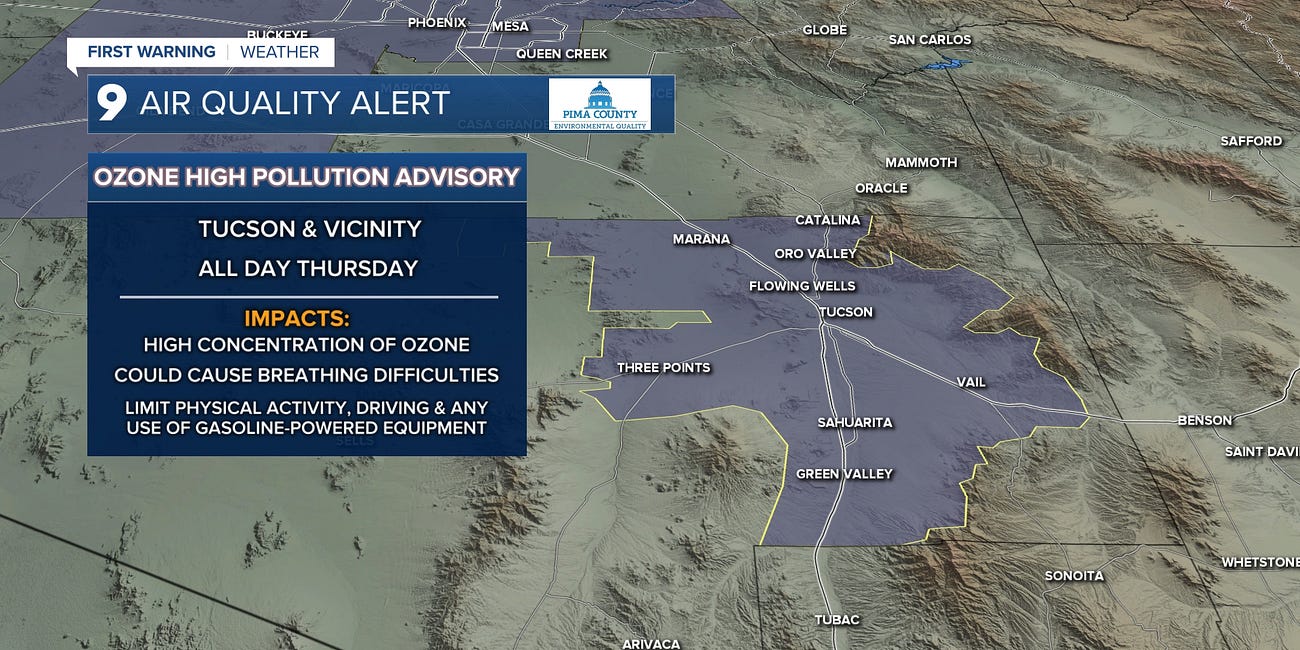🏗️ For Supervisor Christy, Profits Trump People
📚 Libraries on Chopping Block as Líderes Abandon Communities 💼 Christy Carries Water for Corporate Polluters 🌎 Tucson at Climate Crossroads - Status Quo or Justicia?
Based on the 9/4/24 Buckmaster Show on KVOI-1030AM in Tucson, AZ.
😽 Keepin’ It Simple Summary for Younger Readers
👧🏾✊🏾👦🏾
🌵 In Tucson, temperatures are getting hotter and hotter because of climate change. 🥵 This is really dangerous for people, especially in poorer neighborhoods. 😓 But some politicians, like Supervisor Steve Christy, care more about protecting businesses than keeping workers safe. 💼 He doesn't want new rules that would make companies give workers breaks and water on super hot days. 🌡️ Christy also wants to close libraries in communities that need them the most. 📚 It's not fair! We need leaders who will take climate change seriously and fight for everyone's right to a healthy environment. 🌎 The future depends on it! ✊🏽
🗝️ Takeaways
🔥 Extreme heat fueled by climate change is a life-or-death issue for Tucson's communities of color
🙅 Supervisor Steve Christy opposes worker protections from dangerous temperatures, prioritizing business profits
😓 Christy's "common sense" rhetoric ignores real suffering and shields corporate polluters from responsibility
📚 Shuttering libraries punishes communities for social crises rather than providing vital support
✊🏽 Tucson needs new líderes committed to bold climate action and environmental justice for all
📚 Topics Discussed
📚 Uncertain Future for Pima County Libraries
Pima County is considering downsizing or closing up to five of its 27 library branches to cut costs and adapt to changing community needs. In an interview on the Buckmaster Show, County Supervisor Steve Christy discussed libraries' evolving role and the challenges they face.
"Libraries are evolving, and we need to recognize that the old model of the neighborhood library... is no longer really applicable," Christy said.
He pointed to issues such as mental health, drug addiction, and homelessness among patrons that are turning libraries into de facto social service centers. This shift has created staffing challenges and concerns about providing a family-friendly environment.
"What they've seemed to have evolved into is some sort of a center for social services," Christy observed. "Staff don't really want to have to deal with folks who are frequenting the library now that have mental health issues, drug addiction issues, or any kind of homeless issues."
Christy believes the county needs to fundamentally re-examine the purpose of libraries to better align with current needs. Consolidating branches and finding alternative uses for underutilized facilities like the downtown main library could allow the county to redirect resources to other priorities.
While painful, Christy sees downsizing as fiscally prudent. "We were always looking at ways of cutting expenses and costs," he said of his business experience. "This same kind of philosophy should always be applying in Pima County government and looking at ways to save the taxpayers' money."
As budgets tighten and society evolves, Pima County's libraries may need to reconsider their traditional role. However, the next chapter on these longtime community institutions remains unwritten.
🥵 Supervisor Christy Also Skeptical of Heat Ordinance
The uncertain future of county libraries was not the only hot topic Supervisor Christy addressed. He also expressed reservations about the county's new heat ordinance to protect workers from extreme temperatures.
"This heat ordinance is putting a lot of stress and strain on employers who are struggling to provide the services and products that their mission in business is all about," Christy argued.
He worried about the "punitive effects" of the ordi” including a "snitch line" for employees to report violations and the potential for work disruptions due to offsite training.
Rather than regulation, Christy believes common sense should prevail when it comes to working in the desert heat. "Yes, it is hot. You must respect the heat, and we must provide shelter for those who are unable to provide it for themselves," he said. "But there is a lot of common sense that goes along with living in the desert and living in Pima County."
With Pima County seemingly getting hotter and drier, the debate over how to protect vulnerable workers is likely to keep simmering. But for Christy, the heat ordinance may be a case of the cure being worse than the disease.
🌵 Monsoon Fading After Stormy Start
Segueing from the political heat to the literal heat, the Buckmaster Show welcomed Dr. Zach Guido from the University of Arizona's Arizona Institute for Resilience (AIR). Dr. Guido provided an update on this year's monsoon season, which appears to be winding down after a strong start.
"I sort of noticed a shift about 10 days ago," Dr. Guido observed. "July was sort of the hot month, I mean hot literally hot month, but also figuratively as it was the wet month, much more so than August."
While Tucson saw near-average rainfall, some areas like Safford were left high and dry. A notable trend in recent years has been the increased intensity of monsoon storms. "These storms come down from the rim, and they're so wind-driven that you're getting the microbursts and the hail," host Bill Buckmaster noted. "Your thoughts?"
Dr. Guido acknowledged the anecdotal evidence of stronger storms but said the limited number of long-term weather stations makes it difficult to identify trends conclusively. He pointed out one study in the Santa Catalina Mountains that suggested an increase in short-duration, high-intensity rain events over the past 60 years. But even those results were mixed.
The long-term trend of rising summer temperatures across the region is far less ambiguous. "Phoenix was its warmest on record. Tucson was fourth" for the June-August period, Dr. Guido reported. Many other Western cities saw their warmest or near-warmest summers in 2024, part of a clear pattern of climate change-driven warming.
So, while the monsoon may have lost its mojo, the summer heat shows no signs of relenting. As Supervisor Christy noted, learning to live with extreme heat is increasingly becoming part of the "common sense" of desert life. Whether that means regulating workplaces or rethinking institutions like libraries, adapting to a hotter, drier climate will be one of the major challenges facing Pima County in the years ahead.
🌀 Atlantic Hurricane Season Defies Predictions
In contrast to the record heat across the U.S., the Atlantic hurricane season has been surprisingly subdued. Despite forecasts for an extremely active season due to record-warm ocean temperatures, as of late August, there have only been five named storms compared to an average of 7.
Dr. Guido explained some possible factors suppressing hurricane activity, including dry air and dust blowing off the coast of Africa, changes in atmospheric temperature profiles, and increased wind shear. But he cautioned against reading too much into the slow start, noting that the season's peak is still to come in September and October.
On the other side of the continent, the Pacific hurricane season has been quiet. Hawaii was hit by three hurricanes in just two weeks, an unusually active period for the islands.
These divergent hurricane storylines underscore how much we still have to learn about these mighty storms and the complex mix of ingredients that fuel them. As Dr. Guido put it, seasonal hurricane forecasts offer an opportunity "to figure out why they were wrong, and we can take that as an opportunity to learn."
In summary, as Pima County grapples with issues from budget cuts to global warming, local leaders like Supervisor Steve Christy are grappling with how to adapt long-standing institutions and practices to a rapidly changing world. Meanwhile, scientists like Dr. Zach Guido are working to understand the complex interplay of factors driving extreme weather events, both in our backyard and around the globe. In a summer of heat waves and hurricane surprises, the only constant seems to be change itself.
🌵 Three Sonorans Commentary
🔥 Pima Supervisors Fiddle while Tucson Burns
As Tucson suffers through another record-breaking summer, with disproportionate impacts on our barrios and communities of color, what are our so-called leaders doing? Supervisor Steve Christy's comments on the Bill Buckmaster show make it clear - nada.
Instead of supporting common-sense protections for workers, like the county's new heat ordinance, Christy parrots Chamber of Commerce talking points. He frets about "putting a lot of stress and strain on employers" and the "punitive effects" of allowing employees to report unsafe conditions.
Pero like, what about the "punitive effects" of heat stroke, heat exhaustion, and even death that our gente face every day laboring in these extreme temperatures? The implication is that a few papeles for businesses are somehow a greater burden than the risks to people's lives and health. That the "costs" to companies outweigh the human costs paid by workers and their familias.
This ordinance is a bare minimum, a recognition of the danger posed by a climate that is only getting hotter thanks to the carbon pollution spewed by many of those same companies. But apparently even that is too much for Supervisor Christy, who would rather confiar en "common sense" and corporations to do the right thing. As if the pursuit of profits has ever prioritized people over pesos.
Even more insulting is Christy's dismissal of the need for these protections. "Yes, it is hot," he concedes, in the understatement of the año. But he insists that anyone who has lived here should know how to handle it, that it's just "part of living in the desert."
Try telling that to the abuelita in Barrio Viejo whose casita doesn't have air conditioning. Or the jornalero in Marana picking crops in 115 degree heat to feed his family. Or the unhoused person baking on the streets with no escape from the relentless sun.
The "common sense" that Christy invokes is code for a callous survival of the fittest mentality that defines the "haves" by their ability to endure hardship and blames the "have nots" for their own suffering. It is the logic of colonialism and capitalism that exploits labor and resources with no consideration for consequences or long-term costs.
But what else can we expect from a Supervisor whose solution to community centers like libraries being overwhelmed by social crises is to close them? In Supervisor Christy's privileged worldview, any public service that doesn't meet a narrow standard of utilidad is just a "dead weight" to cut rather than a lifeline to support.
As Dr. Zach Guido's harrowing accounts of record heat and intensifying monsoons make clear, climate change is already a life-or-death challenge for nuestra gente in Southern Arizona. We cannot rely on the "common sense" of those in power, who time and again prioritize profits over people and deny the urgency of the crisis we face.
Instead, we must demand bold acción not only to shield our communities from the worst impacts of rising temperatures, but to tackle the root causes of the climate catastrophe. We need líderes who will stand up to corporate contamination, fight for climate and environmental justicia, and una transición justa to a regenerative economy that works for all.
Tucson's future cannot be left in the hands of those like Supervisor Christy who would fiddle while our barrios burn. It is time for a new generation of leaders rooted in our communities, accountable to our gente, and committed to leading with the compassion and urgencia that this moment demands. Sólo así can we weather the storms to come. ✊🏽
If you enjoyed this article, buy us a cup of coffee!
Previous Show:
🌫️ Tucson's Summer Ozone Levels Spike, Raising Air Quality Concerns
Based on the 8/29/24 Buckmaster Show on KVOI-1030AM in Tucson, AZ.









Christy is showing lousy priorities.